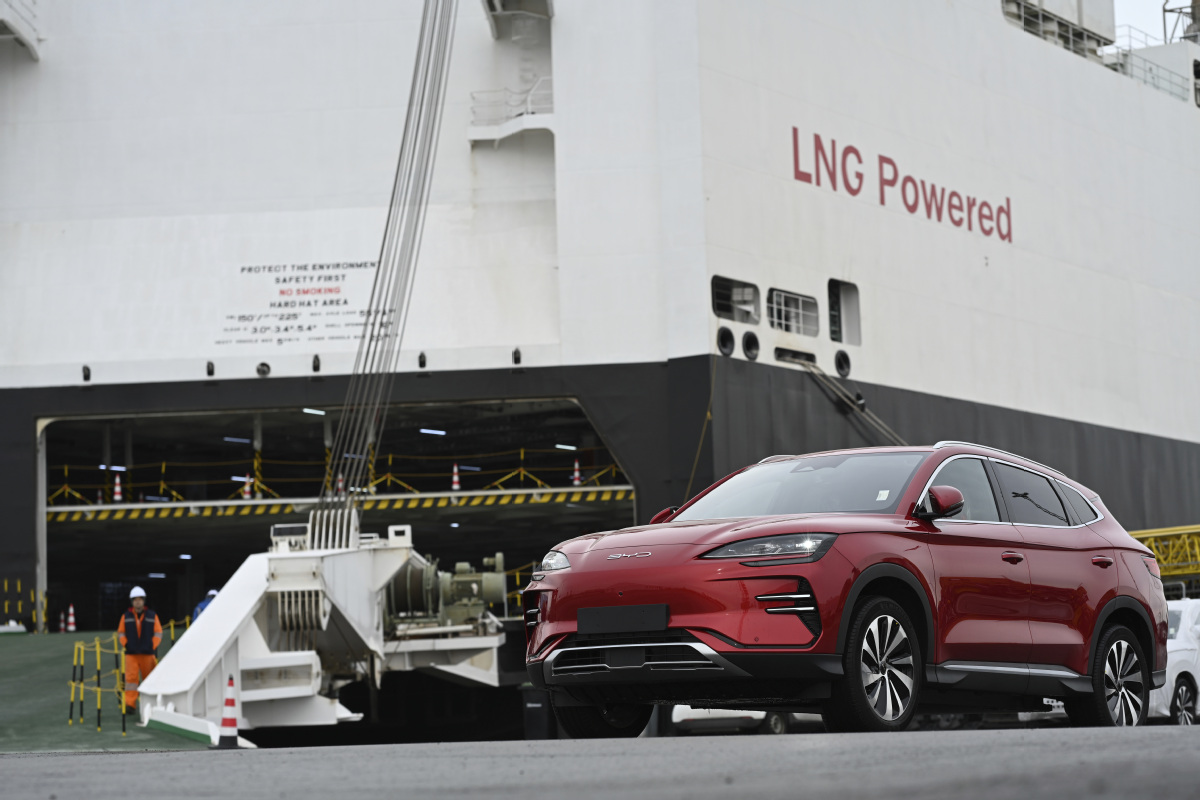From Shenzhen to Bremen, automotive cooperation takes new steps forward

SHENZHEN — A ro-ro ship under the name BYD Explorer No 1, the first of the new energy vehicle giant's "shipping fleet" — with another seven transport ships under construction — arrived at the port of Bremerhaven, Germany, in late February after setting sail from Shenzhen, Guangdong province.
More than 3,000 NEVs manufactured by the automaker were unloaded.
BYD Explorer No 1 is the epitome of the rapid development of China's auto industry and the continuous advancement of globalization in recent years, and also represents the advanced cooperation between China and Germany in automobiles.
For a long time, China has been the world's largest auto market for German auto companies such as Volkswagen, Mercedes-Benz and BMW, as well as an important global production, research and development base. In recent years, Chinese cars have developed rapidly with electrification, constantly enriching global supply and expanding cooperation in the Sino-German auto sector.
On Aug 1, 2022, BYD announced a partnership with Hedin Mobility, a leading European dealership group, successfully introducing multiple NEV models into Germany, marking a promising start to localized operations. As of now, BYD has established stores in 23 cities across Germany, where consumers can test drive and purchase vehicles in cities like Frankfurt, Hamburg and Cologne.
Furthermore, BYD has signed cooperation agreements with SIXT, a leading German car rental company, which will procure at least 100,000 NEVs from BYD in six years. Additionally, BYD inked a global strategic cooperation agreement with Shell to jointly enhance the charging experience for BYD's European users.
According to Motor1.com, an automobile news website in Europe, there was a major change in the European auto market in 2023 as a result of the rise of Chinese auto brands.
On the basis of 23 Chinese car brands, the year 2023 saw another seven new Chinese brands enter the European market. Chinese branded vehicles newly registered in Europe reached 322,000 last year, an increase of 79 percent year-on-year, and its market share reached a record 2.6 percent.
A BYD spokesperson said that the company's performance in the German market is steadily improving, receiving positive affirmation from local mainstream media regarding product innovation design, excellent driving performance, and the safety of battery technology — along with enthusiastic feedback from consumers.
The European market, including Germany, is nurturing the growth of the Chinese auto industry while the Chinese market continues to provide a critical platform for the globalization of the German auto sector. The bilateral cooperation between the two countries' automotive sectors has entered a new phase.
On April 11, Volkswagen Group said it would invest 2.5 billion euros ($2.7 billion) to further expand the production and innovation center in Hefei, Anhui province, reinforcing its local R&D capabilities. It also plans to manufacture two Volkswagen models co-developed with Xpeng Motors, with the first model being a mid-sized SUV scheduled for production in 2026.
BMW is confident in China's economic prospects and intends to scale up its investment in the country, said BMW Chairman Oliver Zipse in a statement.
For 30 years, BMW has been deeply rooted in China, benefiting from free trade and China's opening-up policy, Zipse said.
Over the past three years, BMW's R&D team in China has tripled in size, and now boasts over 3,000 staff in software development, autonomous driving, UI/UX design development, and participating in projects such as the BMW New Generation Models.
Mercedes-Benz Group Chairman of the Board of Management Ola Kaellenius also expressed his optimism toward China's continued pursuit of high-level opening-up and the potential of the Chinese market.
"We will continue to invest in China, strengthen cooperation with our Chinese partners, promote electrification as well as digital transformation, and continue to contribute to Germany-China economic and trade cooperation," Kallenius said.
Sino-German automotive industries have been increasingly complementing each other. Notably, two of the largest shareholders in the Mercedes-Benz Group are Beijing Automotive Group from China, and Li Shufu, chairman of Zhejiang Geely Holding Group. Geely is also the parent company of Swedish luxury automaker Volvo.
In addition, Volkswagen Group has been increasingly relying on large Chinese battery companies like Gotion High-Tech for battery development and manufacturing.
Fu Bingfeng, executive vice-president and secretary-general of the China Association of Automobile Manufacturers, said that the automobile industry is a typical global industry. With the improvements in China's automobile production standards, Chinese vehicles, in the process of going global, have brought new technologies, low-carbon products, and unique concepts to international consumers. Concurrently, Chinese automakers establishing factories overseas and configuring supply chains have also contributed to the socioeconomic development of local communities.
Xinhua

